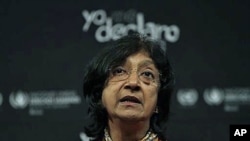United Nations human rights chief Navi Pillay has dismissed Syrian President Bashar al-Assad’s recent claims that the U.N. is not a credible organization and that her commission of inquiry failed to contact his government during an investigation of human rights violations in his country.
Earlier this week, U.S. television network ABC aired an interview with President Assad in which he said he had not received documents or evidence to support recent findings by a U.N. commission of inquiry that crimes against humanity have been committed during the on-going crackdown on dissenters. He also questioned the United Nations’ credibility.
Pillay, who is in New York for U.N. observances of Human Rights Day on Saturday, told reporters that her office has been in contact with Assad’s ambassador in Geneva throughout the process. She added that neither the fact-finding commission her office set up in August nor the international team of investigators who wrote the recent report was allowed into Syria by Assad.
“I think it is very important he does [allow U.N. teams into Syria], though, especially if he is under the impression that the U.N. and the information it provides is not credible," said Pillay. "It is very important we go there, then, and check his side of the story.”
The international panel’s report found that members of the Syrian army and security forces have committed crimes against humanity in their repression of a largely civilian population in the context of a peaceful protest movement. The crimes detailed include murder, torture, rape and arbitrary detention.
The panel also found that more than 300 children were among the more than 4,000 people killed since the protests began in mid-March.
Assad has taken the position that his government is fighting armed terrorists and infiltrators who want to topple his regime, and that many of the dead are members of his own security forces who are protecting the population.
Pillay said she acknowledges Syrian forces have been killed, but repeated her warning that the country could be slipping into civil war.
“I acknowledge that almost 1,000 of President Assad’s security forces have also been killed in this conflict," she said. "And this is why I am alerting the world that as you have more and more defectors from the security forces, this may well develop into a fully-fledged civil war.”
There has been, by some accounts, heated discussion among Security Council diplomats as to whether the human rights chief should brief the 15-member council on the situation in Syria. Russian Ambassador Vitaly Churkin, the council’s president during December, said after consultations, the council has invited Pillay to speak at a closed meeting on Monday.
Churkin said reports that Russia and China objected to such a briefing were “patently not true.” He added that Pillay also will be asked to brief the council on the current situation concerning Palestinian human rights.
Pillay said she would brief the council if invited. However, she expressed distress that the last time she met the members in August, the death toll stood at 2,000. Now it is more than 4,000. She said lives could have been changed if action had been taken sooner.
| Join the conversation on our social journalism site - Middle East Voices. Follow our Middle East reports on Twitter and discuss them on our Facebook page. |




